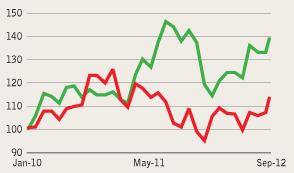Ups and downs
The Burmese kyat was selling on Friday at 980 to the US dollar, while buying at 972. The price of gold is 651,900 kyat per one tical. Fuel prices remain constant: petrol 820 kyat; diesel 950 kyat; octane 950 kyat per litre. High-quality Pawsanhmwe rice is still 1,300-1,700 kyat per basket, while low-quality Manawthukha rice is set at 900 kyat per basket at most Rangoon Markets.
World Bank to loan US$100 million for Irrawaddy River basin
The World Bank has pledged to cooperate with the Department of Water Resources in Burma and loan US$100 million to develop the Irrawaddy river basin. The project also aims to build weather information centers and increase the efficiency of inland water transport in Burma. Sein Tun, director of the Department of Water Resources, said that these funds will be divided and distributed at 30 percent per phase of the project over the next six years, reported Myanmar Business Today.
Burma, Israel sign bilateral trade agreement
Burmese and Israeli diplomats signed a Reciprocal Promotion and Protection of Investments Agreement on 5 October aimed at boosting bilateral trade. Israel becomes the 11th nation to sign such a deal with Burma. The move comes despite an international campaign to divest in Israel due to its occupation of Palestinian territory and what some are calling “genocide” in a recent assault on Gaza. Israel has been linked to selling weapons to the former Burmese military regime.
Thai energy giant fires up coal power plant project
Thailand’s Ratchaburi Electricity Generating Pcl has signed an agreement to co-invest in a US$5.2 billion coal power plant in Burma. Three other companies that will also invest in the project are Blue Energy and Environment, Vantage Company Limited and Kyaw Kyaw Phyo Company Limited.
US, NASA launch disaster prevention project in lower Mekong
USAID and NASA announced on Monday that they will fund a five-year programme called SERVIR Mekong, an environmental and disaster prevention initiative in the lower Mekong region. The programme, which will be implemented by the Asian Disaster Preparedness Centre, is designed to ensure the lower Mekong region is better prepared to deal with floods and other natural disasters.
Tourists from 67 countries now eligible for E-visas
The Burmese government has added 24 more countries to the list of nationalities eligible to apply online for tourist visas. Commonly known as E-visas, there is now a total of 67 nationalities now welcome to Burma on a visa-on-arrival system. According to the Ministry of Hotel and Tourism, more than 6,000 E-visa applicants have been approved since the project launched on 1 September.
Burma’s growth rate set to hit 8.5 percent: World Bank
In a report on East Asian countries’ economies released on Monday, the World Bank estimated Burma’s growth rate at 8.5 percent for 2014 and 2015, a figure higher than any other nation it surveyed, including China. The World Bank this year recommenced lending to the Burmese government, and in January it pledged US$2 billion in development aid to the country for projects such as healthcare and energy supply.
11 govt enterprises report financial losses
Burma’s Finance and Revenue Minister Win Shein announced on Sunday that 11 out of 43 government-owned enterprises have incurred financial losses. These include: the Electricity Supply Enterprise; Myanmar Economic Bank and the Myanmar Foreign Trade Bank; Myanmar Motion Picture Enterprise; and the Myanmar Railways and Road Transport department.
Mandalay wraps up international trade show
The Mandalay International Trade Show wrapped up on Monday. In total, 43 companies from around the world displayed a variety of products—ranging from electronics and home appliances to automobiles and solar panels, as well as exhibitions on textiles from Thailand and medicine from India.
Burma announces rules governing investment in Thilawa
Burma’s Ministry of National Planning and Economic Development announced on Monday the rules governing investment in the Thilawa Special Economic Zone. The rules allow for investment in a broad range of activities, including manufacturing operations which involve the use of asbestos, imported industrial waste and toxic chemicals. The rules also specify minimum levels of investment based on the type of business, beginning at US$300,000 for service and manufacturing enterprises.
[related]



